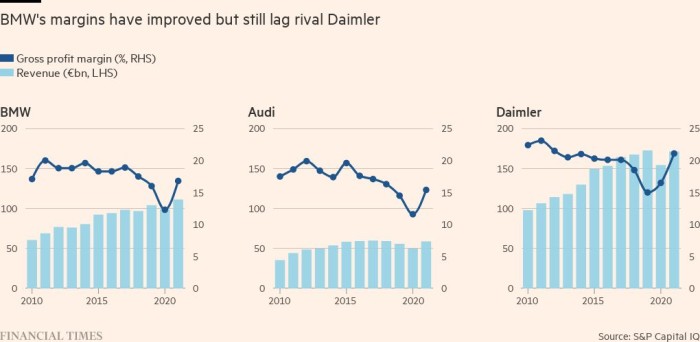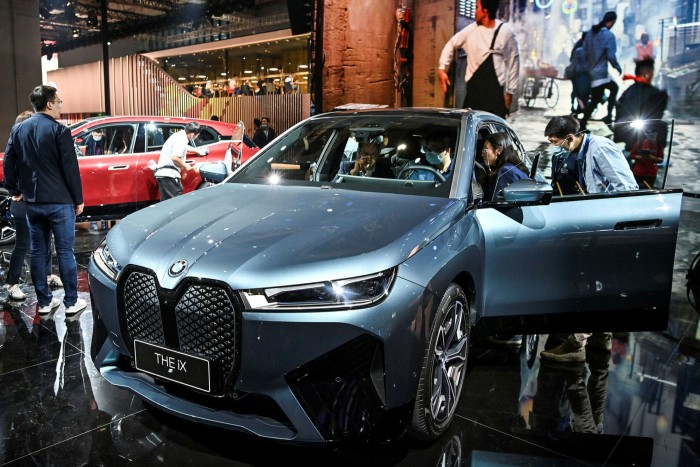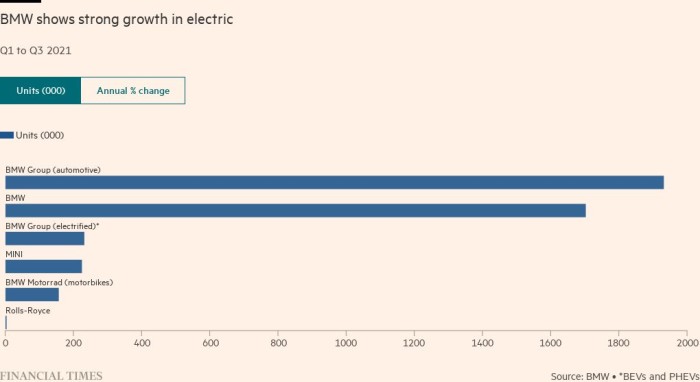BMW left to play electric car catch-up after a pioneering charge
On stage at the launch of BMW’s all-electric i3 in 2013, Herbert Diess claimed the company had “completely redesigned mobility”. The model, one of the first mass-market electric cars, would, he predicted, “rewrite the rule book of our industry”.
Eight years on, Diess is indeed rewriting the rule book. But at Volkswagen, where he is the driving force behind the group’s €35bn push into battery-powered vehicles in the aftermath of the diesel emissions scandal.
Meanwhile the company he left in 2015 is playing catch-up in the EV market.
Electric models made by its closest competitors, such as the Mercedes luxury EQS and VW’s Audi e-tron range, are already on sale. Both brands are also adding several new electric models to their line-ups. BMW will only start delivering its flagship iX and i4 electric cars to customers in November.

Far from being rewarded for its pioneering spirit, BMW was punished for being “too early”, said Michael Muders, a fund manager at Union Investment, a top 20 BMW shareholder.
“They burnt €2bn on the i3, and the market was not ready yet,” he said. Faced with steady, but muted demand for the vehicle, BMW did not follow up with the widely expected i5, and several of the engineers and designers who worked on the i range left, mostly for EV start-ups.
When electric vehicles finally began to take hold in the past couple of years — more than 3m are expected to be sold in 2021 — Muders said, BMW “were not prepared, they were late”. The company “had to start from zero, or almost from zero,” said Ingo Speich, portfolio manager at Deka, another BMW investor.
BMW chief executive Oliver Zipse strongly disagrees. “I don’t think we are slower,” he said last month, on the sidelines of the Munich car show. “Among premium manufacturers we have sold the most electrified cars this year.”
Certainly, in the nine months to the end of September, BMW sold almost 232,000 electrified cars, putting it behind only Tesla, China’s BYD and micro EV manufacturer Shanghai GM Wuling worldwide, according to figures compiled by Bernstein.
However only 60,000 of those were pure electric cars, such as the model sold by BMW-owned Mini. The rest were plug-in hybrids, which contain a combustion engine but can run on battery only for short periods.
More pure electric BMWs are on the way. As well as the iX and i4, BMW will offer a battery-powered model in “every single relevant segment” by 2023, chief financial officer Nicolas Peter told the Financial Times, including versions of the bestselling 5 Series and the X1 SUV. Over the next 10 years, BMW plans to deliver 10m fully electric vehicles.

Yet the company is also decidedly not planning to bring its combustion-engine line-up to an early end. Its assumption is that half of the cars sold in 2030 will be petrol or diesel models, and Zipse said in September “when you say you are not going to serve [this half of the market], you are setting yourself on a course to shrink”.
BMW’s public position is at something of a contrast with its key competitors, who have been battling it out to deliver ever more ambitious EV targets. Mercedes-owner Daimler said in July it would be “in a position” to go all-electric by 2030, while Audi announced in August that 2026 would be the last year it launched a petrol or diesel model.
Their positioning is backed up by a forecast from consultancy McKinsey, which predicted last month that the three largest car markets — Europe, the US and China — would be about 70 per cent electric by the end of the decade.
But Zipse said that BMW was not sure the change would happen so quickly. “I can now only look at the time between 2021 and 2030 . . . everything else is ambition,” he said. BMW, he added, “wants to remain profitable”.
His frankness has not been rewarded by investors. While Daimler shares have risen 42 per cent this year and VW, which owns Audi, is up by more than 30 per cent, BMW stock has risen just over 20 per cent.
And while the company, which is more than 45 per cent owned by the Quandt-Klatten family, is not under as much pressure from shareholders, “we are not happy with our capital market valuation,” Zipse said.
BMW’s announcement last month that it was raising its profit margin guidance from between 7 and 9 per cent, to between 9.5 and 10.5 per cent — in the midst of a semiconductor crisis that has devastated the sector and caused sales to drop by a third — certainly helps.

Jürgen Pieper, an auto analyst at German private bank Metzler, believes it will not be long before the market takes a second look at BMW. On profitability, “they are the winners of the last four or five quarters among the premium brands”, he said.
“Maybe the VWs and the Teslas have the more consequential [electric vehicle] platforms,” Pieper added, “but then you sit in a BMW and think: this product is just great.”
BMW also said it would be ready for a more rapidly growing electric vehicle market if its predictions were wrong, with its dedicated all-electric “Neue Klasse” range due to be unveiled in 2025.
It has committed to using recycled and recyclable materials in future models, and recently invested in Lilac Solutions, a US start-up that claims it can extract lithium for EV batteries from salt water.
But there are no plans to follow rivals with higher electric vehicle targets.
“We think twice before we communicate something,” Peter told the FT. “We are not going to change and overpromise against something which we are not going to deliver.”
For all the latest Business News Click Here
For the latest news and updates, follow us on Google News.
